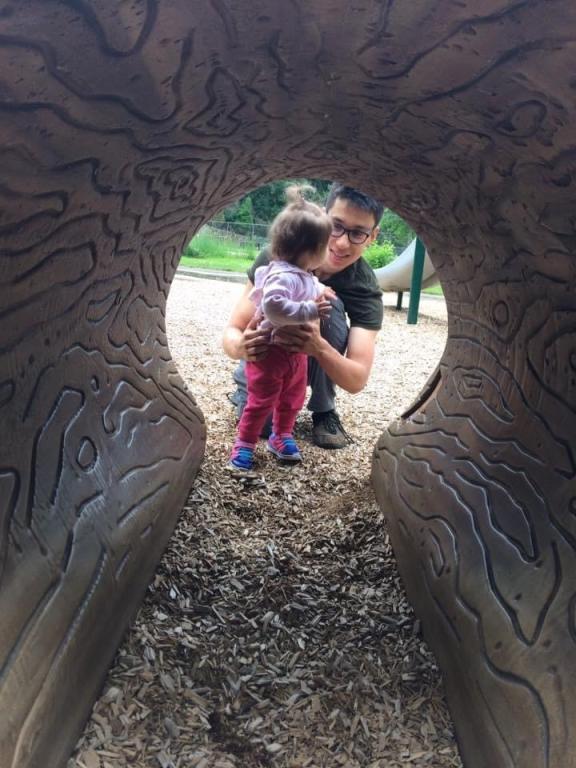 There was a popular science-fiction television series back in the 1960s titled The Time Tunnel. Two scientists working on a special project for the US government created a time tunnel and got trapped in it. They were propelled back to various important events in history and forward into the future. Sometimes I wish I had a time machine, or time tunnel. That way I could possibly go back to January of this year and rearrange events so my son Christopher would have been spared from his traumatic brain injury and current comatose state.
There was a popular science-fiction television series back in the 1960s titled The Time Tunnel. Two scientists working on a special project for the US government created a time tunnel and got trapped in it. They were propelled back to various important events in history and forward into the future. Sometimes I wish I had a time machine, or time tunnel. That way I could possibly go back to January of this year and rearrange events so my son Christopher would have been spared from his traumatic brain injury and current comatose state.
I think about a time tunnel whenever I consider Christopher’s special bond with his daughter Jaylah. Here’s a beautiful and poignant picture Christopher’s wife Keyonna took of Christopher and their daughter Jaylah, while they were at a playground sometime ago. I often think of that picture. Christopher and Jaylah are there playing in the past and I am on the other side of the time tunnel, viewing them from the future. I want to transport them playing together into the future. I want to see them playing on this side of the tunnel, where I am waiting today.
I don’t know what the constantly unfolding future holds. I only know the Ancient of Days holds our future. I look ahead, though dimly, through the tunnel of time. God is there, just as God is in the past and present, or as twentieth century theological giant Karl Barth wrote, God’s eternality is pre-temporal, supra-temporal, and post-temporal. These distinct temporal forms mutually coinhere (“perichoresis” as in the doctrine of the Trinity) without separation in pure or seamless duration and are identical with God’s being (See Church Dogmatics, II/1, 611, 619-640 {analogical extension of perichoresis on page 640}; George Hunsinger, Disruptive Grace, 198). Barth writes, “Pre-temporality, supra-temporality and post-temporality are equally God’s eternity and therefore the living God Himself.” (Barth, 638)
Moving on from Barth, the Bible claims that God is from everlasting to everlasting: “I am the Alpha and the Omega, the First and the Last, the Beginning and the End.” (Revelation 22:13; NIV)
Isaac Watts did not know of Barth, but he certainly knew Scripture. He penned the classic hymn “O God, Our Help in Ages Past” in 1719 with the Bible in mind. In my estimation, this hymn could have been written in 2019 or 2029. While it is an old classic, it never gets old to me. Why? Because God, the Ancient of Days, never gets old. Only we do. God is our help past and present, our hope, our eternal home:
O God, our help in ages past,
our hope for years to come,
our shelter from the stormy blast,
and our eternal home.
When I visit Christopher at the hospital, I tell him we are doing everything possible to provide support and resources, as well as shelter and a place to call home for Keyonna and Jaylah. I tell him that our hope is that he will join them in a new abode some day. I tell him how so many people are praying and thinking and financially caring for them. He always appears more responsive in his gestures and mannerisms when I mention his wife and daughter and how they are doing.
I am often more responsive spiritually regarding the daily, unrelenting grind of time when recounting Psalm 90. I quote the beginning and closing verses:
Lord, you have been our dwelling place
throughout all generations.
Before the mountains were born
or you brought forth the whole world,
from everlasting to everlasting you are God…
Satisfy us in the morning with your unfailing love,
that we may sing for joy and be glad all our days.
Make us glad for as many days as you have afflicted us,
for as many years as we have seen trouble.
May your deeds be shown to your servants,
your splendor to their children.
May the favor of the Lord our God rest on us;
establish the work of our hands for us—
yes, establish the work of our hands. (Psalm 90:1-2, 14-17; NIV)
We need not be trapped in a time tunnel. God can free us from the clutches of a past or present that enslaves us: “Satisfy us in the morning with your unfailing love, that we may sing for joy and be glad all our days. Make us glad for as many days you have afflicted us, for as many years as we have seen trouble.” God, reveal your deeds to your servants and your splendor to my children and their children throughout all generations. May my son squeeze my hand when prompted. May he hold his daughter in his hands and arms again. Establish the work of our hands. Yes, establish the works of our hands.












